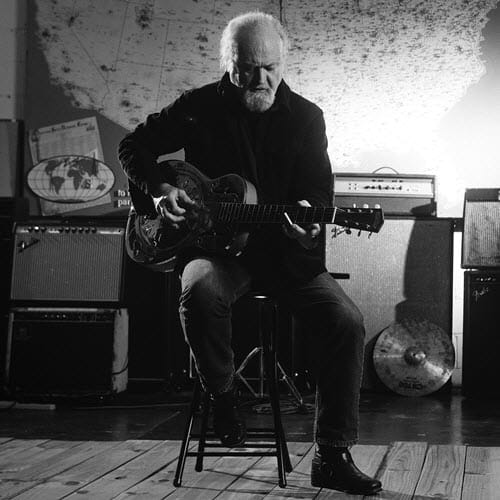Tinsley Ellis Goes Acoustic

photo credit: Jordan Pilgrim
“I’ve threatened to do this for the past 40 years,” says Tinsley Ellis, discussing the release of his first all-acoustic album, Naked Truth. The veteran Georgia musician’s dozen-song set arrives on the heels of last year’s U.S. acoustic tour, during which Ellis amassed over 100 solo appearances. “I wanted the record to be a snapshot in time of what I’m doing on the road,” Ellis says. “I wanted it to be something different.”
Well-known for his blazing brand of blues-rock, the singer/ guitarist first caught fire in his hometown of Atlanta in the early 1980s, forming The Heartfixers, with Chicago Bob Nelson, and recording three albums for the Landslide label. In 1988, Ellis left the Heartfixers and began his own recording relationship with Alligator Records, debuting with Georgia Blue. During the next 35 years, Ellis recorded 17 albums—Naked Truth marks his 21st release—with over half issued by Alligator, the venerated independent Chicago label, widely considered the home of the blues for half a century.
Over the past four decades, Ellis has relentlessly toured nationally and internationally, earning a reputation as one of the preeminent stewards of the blues. “It turns into that over time, doesn’t it?” he says. “One of the biggest compliments you could ever pay an artist would be to refer to them as a blues musician or as a folk musician. It takes a lifetime for most of us to get to that point.”
In recent years, Ellis has been building the momentum to record an all-acoustic collection. He had been inserting a mini-set of acoustic songs, mid-show, into his performances. And when the COVID-19 pandemic kept the road warrior homebound in Georgia, Ellis took to the virtual world, posting acoustic offerings on social media each week. He called it the Sunday Morning Coffee Song.
The online outlet kept Ellis active, giving him a chance to not only indulge his deepening love of Delta blues, but also his lifelong affinity for artists such as Bob Dylan and Gregg Allman. When Ellis returned to touring, his fans let him know what they thought of both his virtual and onstage acoustic detours. “People would come up to the merchandise table after or write me on the internet to say, ‘I wish you’d do a whole album of these songs.’ The fans egged me on,” Ellis says. “You really can never go wrong making an album for the fans.”
Ellis employed his wealth of options, working up a tracklist that centered around a diverse set of Delta blues tunes. He’d recently written several songs specifically for the acoustic guitar, had a back catalog of songs that could easily translate unplugged and could even dip all the way back to his college days in the ‘70s for some uncut gems. There were instrumentals, selections that leaned into his appetite for folk music and three choice covers— from Son House, Willie Dixon and Leo Kottke—that linked to the past century of American blues and folk.
“What connects the dots in all the music I do is my love for guitar,” Ellis says. “I play guitar music, and it just so happens that blues and folk really lend themselves to the acoustic guitar and the sweet sounds a guitar makes.”
The sweet sounds Ellis conjured up on Naked Truth came courtesy of his 1969 Martin D-35 acoustic and his 1937 National Steel O-series resonator guitar. He kept the session’s setup simple—hit the record button and go. There was no overdubbing; he utilized a single microphone for his vocals and guitar and kept another mic at his feet to capture his beat-keeping stomp on the wooden floor. “It’s the wood that makes it good,” he says.
Other than “Death Letter Blues,” from a prior session led by Eddie 9V, Ellis produced the album and wrote nine of its 12 songs. One cut—“Windowpane”— Ellis created in real-time. “It’s probably my favorite song of the bunch,” he says. “Alligator asked for lyric sheets, and I didn’t have them because I’d just made them up on the spot.”
As an album, Naked Truth jockeys between impassioned, in-the-moment spontaneity— especially on the blues tracks— and a studied craftsman’s sense of care and nuance, particularly on the instrumentals. Ellis says he trusted “the vibe” when choosing the keepers and offers a plainspoken summary of the set as a whole. “This album is very much my confession,” he says. “This is the kind of music I like— blues songs, folk songs, happy songs, sad songs. And there is no place to hide.”
As a native of, and messenger for, the region where such important American art forms as blues and folk were born, Ellis has never hidden from his roots. Even so, he suggests two watershed moments when the influence of place shifted forever. “After Jimi Hendrix, everything changed. Everything opened up,” he says. “And the same thing has happened with the internet.”
With virtually unlimited access to music, Ellis contends that there’s never been a better time than now for the listener—and the art in general. Yet, even as he appreciates modern tech, Ellis still believes in the road. “You’ve got to get out there and work at it. The internet is not going to give you soul. The internet is not going to get you laid. That’s what live music does for you.”




















